Hunters & Collectors are an Australian rock band formed in 1981. Fronted by founding mainstay, singer-songwriter and guitarist Mark Seymour, they developed a blend of pub rock and art-funk. Other mainstays are John Archer on bass guitar, Doug Falconer on drums and percussion. Soon after forming they were joined by Jack Howard on trumpet and keyboards, Jeremy Smith on French horn, guitars and keyboards, and Michael Waters on trombone and keyboards. Also acknowledged as a founder was engineer and art designer Robert Miles. Joining in 1988, Barry Palmer, on lead guitar, remained until they disbanded in 1998. The group reformed in 2013 with the 1998 line-up.

Human Frailty is the fourth studio album by Australian rock band Hunters & Collectors, which was released on 7 April 1986. It was a commercial and critical success. The album peaked at No. 10 on the Australian Kent Music Report Albums Chart and No. 5 on the New Zealand Albums Chart. Four singles were issued from the album, "Say Goodbye", which reached No. 24 on the Kent Music Report Singles Chart; "Throw Your Arms Around Me", No. 49; "Everything's on Fire", No. 78; and "Is There Anybody in There", which did not chart in Australia but did reach No. 41 on the New Zealand Singles Chart.
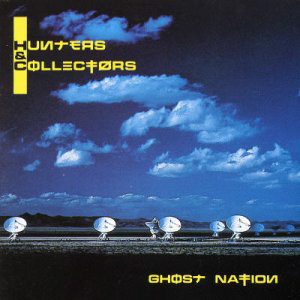
Ghost Nation is the sixth studio album by Australian rock band, Hunters & Collectors. It was co-produced by the band with Clive Martin and issued on White/Mushroom Records on 27 November 1989. It reached No. 10 on the ARIA Albums Chart, No. 29 in New Zealand and No. 31 in Sweden.

Mark Jeremy Seymour is an Australian musician and vocalist. He was the frontman and songwriter of rock band Hunters & Collectors from 1981 until 1998. Seymour has carved a solo career, releasing his debut solo album in 1997 and winning an ARIA Award in 2001 for One Eyed Man in the category of Best Adult Contemporary Album.

Cut is the seventh studio album by Australian rock band, Hunters & Collectors. It was mostly produced by American Don Gehman with the group and issued by White Label/Mushroom on 5 October 1992. It reached No. 6 on the ARIA Albums Chart and No. 17 on the New Zealand Albums Chart. The band were nominated for Best Group at the 1992 ARIA Music Awards and Album of the Year for Cut in the following year.
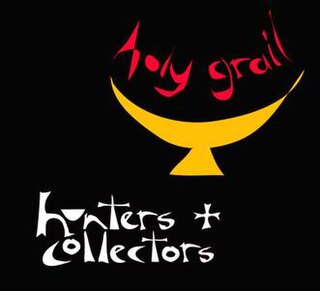
"Holy Grail" is a song performed by the Australian band Hunters & Collectors on their 1992 album Cut. With lyrics referring to popular Holy Grail mythology, the song is an anthemic single inspired by Napoleon's march to Russia in 1812, but also referencing the Hunters and Collectors' flagging attempts to "crack" the American market.

"Throw Your Arms Around Me" is a song by Australian rock band Hunters & Collectors first released as a single in November 1984 by White Label for Mushroom Records. A re-recorded version of the song would later appear on the band's 1986 album Human Frailty. Written by bass guitarist John Archer, keyboardist Geoffrey Crosby, drummer Douglas Falconer, trumpet player Jack Howard, recorder/mixing engineer Robert Miles, vocalist/lead guitarist Mark Seymour and trombone player Michael Waters. The song captures the intensity of sensual love at the same time portraying its fleeting nature with lyrics including "And we may never meet again, So shed your skin and let's get started".

Juggernaut is the ninth and final studio album by Australian rock band, Hunters & Collectors. The album, recorded in 1997, was co-produced by the group with Kalju Tonuma and Mark Opitz. It was released on 26 January 1998 on Mushroom's White Label. With its release, Hunters & Collectors announced they would disband after the Say Goodbye Tour – they gave their final performances in late March 1998. The album peaked at No. 36 on the ARIA Albums Chart and No. 48 on the New Zealand Albums Chart.

Demon Flower is the eighth studio album by Australian rock band, Hunters & Collectors and was released on 16 May 1994. It was co-produced by the band with Nick Mainsbridge, reaching No. 2 on the ARIA Albums Chart and was certified Gold by the Australian Recording Industry Association. It also peaked at No. 9 on the New Zealand Albums Chart.

What's a Few Men? is the fifth studio album by Australian rock band Hunters & Collectors, which was released on 16 November 1987. The album's title was drawn from Albert Facey's memoir A Fortunate Life. The album peaked at No. 16 on the Australian Kent Music Report Albums Chart and No. 9 on the New Zealand Albums Chart. It provided the singles, "Do You See What I See", issued in October 1987 and "Still Hangin' Round", in February the following year. "Do You See What I See" reached No. 33 in Australia while in New Zealand it became their highest charting single at No. 13.

Hunters & Collectors is the self-titled debut studio album by Australian rock band, Hunters & Collectors, which was released on 26 July 1982. It was produced by the band with Tony Cohen as audio engineer. The album peaked at No. 21 on the Australian Kent Music Report Albums Chart and No. 14 on the New Zealand Albums Chart. The album's first single, "Talking to a Stranger", was released ahead of the album on 12 July, and was accompanied by a music video directed by film maker Richard Lowenstein, but it did not reach the Top 50 on the related singles chart.
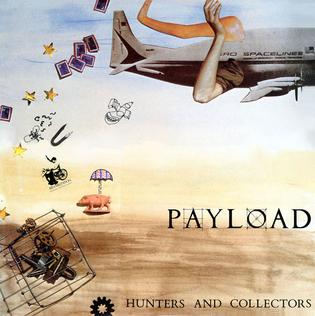
Payload is the second extended play by Australian rock music group, Hunters & Collectors, which was issued on 29 November 1982. It was co-produced by the group and Mike Howlett; and reached No. 31 on the New Zealand Singles Chart but did not reach the top 100 in Australia. Its lead single, "Lumps of Lead", was also released in November but did not chart in either Australia or New Zealand despite a music video by film maker, Richard Lowenstein.
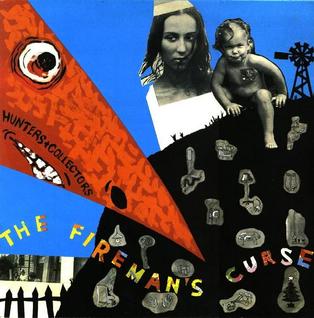
The Fireman's Curse is the second studio album by Australian rock band, Hunters & Collectors, which was released on 5 September 1983. It was co-produced by Konrad Plank and the band in Neunkirchen, Germany. The album peaked at No. 77 on the Australian Kent Music Report Albums Chart and No. 46 on the New Zealand Albums Chart. The lead single, "Judas Sheep", was released in August that year but failed to reach the Top 50 on the Australian singles chart, however it peaked into the top 40 in New Zealand.

The Jaws of Life is the third studio album by Australian rock band Hunters & Collectors; it was released on 6 August 1984. It was co-produced by Konrad Plank and the band in Weilerswist, Germany. The album peaked at No. 89 on the Australian Kent Music Report Albums Chart and No. 37 on the New Zealand Albums Chart. The only Australian single from the album, "The Slab" /"Carry Me", was released as a Double A sided single, in August but failed to chart on the Australian or New Zealand singles charts.

"Say Goodbye" was the lead single from Australian pub rockers, Hunters & Collectors' fourth studio album, Human Frailty. It was released ahead of the album on 17 February 1986 in both 7" and 12" formats. It peaked at No. 24 on the Australian Kent Music Report Singles Chart and No. 20 on the New Zealand Singles Chart. "Say Goodbye" was co-written by band members John Archer, Doug Falconer, Jack Howard, Robert Miles, Mark Seymour, Jeremy Smith, and Michael Waters.
Living Daylight is the third extended play by Australian rock music group, Hunters & Collectors, which was issued on 13 April 1987. It was co-produced by the group and Greg Edward; and reached No. 41 on the Australia Singles Chart and No. 25 on the New Zealand Singles Chart.
Collected Works is the first compilation album by Australian rock group, Hunters & Collectors. It was issued on 19 November 1990 by Mushroom Records' White Label and includes material from their previous six studio albums as well as a re-recording of "Throw Your Arms Around Me", which was released as a single. The album peaked at No. 6 on the ARIA Albums Chart and No. 26 on the New Zealand Albums Chart.

"Everything's on Fire" was the third single from Australian pub rockers, Hunters & Collectors' fourth studio album, Human Frailty. It was released after the album on 18 August 1986 in both 7" and 12" formats. It peaked in the top 100 on the Australian Kent Music Report Singles Chart and No. 44 on the New Zealand Singles Chart. "Everything's on Fire" was co-written by band members John Archer, Doug Falconer, Jack Howard, Robert Miles, Mark Seymour, Jeremy Smith, and Michael Waters.
"True Tears of Joy" was the fourth single from Australian pub rockers, Hunters & Collectors' seventh studio album, Cut. It was released after the album on 23 November 1992. It peaked at No. 14 on the ARIA Singles Chart – the highest charting single of their career – and No. 47 on the New Zealand Singles Chart. "True Tears of Joy" was co-written by band members John Archer, Doug Falconer, Jack Howard, Robert Miles, Barry Palmer, Mark Seymour, Jeremy Smith, and Michael Waters.
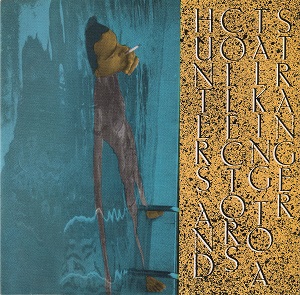
Talking to a Stranger is the second single by Australian pub rock band Hunters & Collectors, released in 1982. It was the only single to be released from Hunters & Collectors debut album. The song reached number 59 on the Australian chart. "Talking to a Stranger", was released ahead of the album on 12 July, and was accompanied by a music video directed by film maker Richard Lowenstein, but it did not reach the Top 50 on the related singles chart.
















